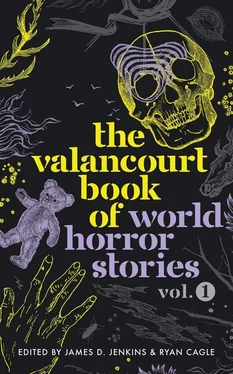Before going to bed, as I was carrying the trash to the kitchen, I saw him take off his clothes in the twilight of the living room, lit only by the electric light from the street. My brother was a very handsome man. Tall, a muscular frame, with a solid Adam’s apple visible in his strong neck, and a pair of vigorous arms forged in the gym and in arm-wrestling contests with other men as competitive as he was. While he was throwing himself on the sofa, half undressed, ready to enter the world of dreams, hoping to continue there his conquest of places and females, the surviving tiny women huddled on the floor and plotted a defense strategy.
One of them boldly scaled the sofa and explored my brother’s body with curiosity. I don’t know if there were tiny men in their world, but coming upon one so large had her fascinated: she sniffed and bit his skin while Joaquín scratched here and there. More tiny women managed to climb up and stopped at his hairy chest, crouching and rolling around among the hair; and others inspected the bulge that could be discerned in his pants. You could see they were comfortable in this new world they had discovered.
Before going out, I left the kitchen light on. I silently approached Joaquín, who was breathing with a heavy rhythm while a number of armed little women insisted on clambering noisily between his legs. He displayed an impudent smile of pleasure that came from the depths of his satisfied male brain. I felt a deep disgust. Without making any noise, I took his car keys from the table as more and more fierce and disheveled little women arrived to check out the state of their new colony. When I closed the door and double-locked the exit, I wondered if my brother’s groans, which I could hear from the other side of the threshold, were of pain or pleasure.
Translated from the Spanish by James D. Jenkins
Elisenda Solsona
MECHANISMS
Most of us know Barcelona, the capital of Catalonia, as a popular tourist destination. But Catalonia as a place in its own right, separate from Spain, wasn’t on many Americans’ radar until October 2017, when the region voted to declare independence from Spain. Catalonia is distinct from the rest of Spain not only in its language ( Catalan, a Romance language in some respects closer to French or Italian than Spanish ) but also in its culture and literary traditions. Catalan literature has a long history of horror and fantastic fiction, the best of which was collected in the massive, 700-page Els altres mons de la literatura catalana [The Other Worlds of Catalan Literature] (2004) . The doyenne of Catalan letters, Mercè Rodoreda, wrote a number of horror stories, and renowned writers Manuel de Pedrolo ( author of the post-apocalyptic Typescript of the Second Origin) and Joan Perucho ( author of the classic vampire novel Natural History) are among those who have made important contributions to Catalan speculative fiction. Elisenda Solsona is a young writer who follows in their tradition. Her award-winning 2019 collection Satèl·lits [Satellites] features weird tales that all take place on the same night, a night when the moon has inexplicably disappeared. ‘Mechanisms’ is the first story from that collection and the first – but we’re sure not the last – appearance of Solsona’s writing in English.
Manel turns off the flashlight, clicks his tongue, and lowers the hood of the rental car. Slowly, with gentle movements, he wipes his large hands on his pants and turns. The tenuous orange glow of the lights on the narrow mountain road allow him to see Òscar silhouetted in the distance, taking photos of the ski lift.
A long silhouette, making sinuous arm movements to find the perfect position. The precise angle. Carefully planting the tripod.
And shooting.
Manel can even make out his curly blond hair he says he wants to cut before the opening of his photographic exhibition.
Is that what he noticed first about him? The lock of curly, almost white hair that covered Òscar’s right eye?
He sits in the car and turns the key hanging from a ring in the shape of a wheel with the logo of the rental car company. Will it start? He has no idea what could be wrong with the engine. The car’s been stalled for half an hour and they’re only a few yards from the hotel. He scratches his thick black beard. He turns the key again. It seems like the engine is responding now, but with a slight wheeze.
As if coughing, wearily.
The car had broken down close to the abandoned ski station, the landscape Òscar had chosen for the final photograph in his series, and he decided to do a first shooting session while Manel checked the engine.
The setting didn’t disappoint him. It’s exactly like the photos he’d seen.
He squeezes his right eye firmly and looks through the viewfinder with his left, lifting his lips slightly. He focuses on the chairs. No, on the cables. And the forest that climbs along with the chairlift up the mountain.
His pupil moves frantically in the viewfinder. The landscape is too dark. The lights on the road give off a very faint glow.
He blinks.
In the background, he hears the engine of the car they rented at the airport. Manel must have already fixed it, but he wants to take one more photo before they leave. His first contact, his first caress of that landscape.
Why had they shut down the ski resort? He read that it’d been closed for eighteen years, but if he knew why, if he knew the reasons behind it, maybe he could capture its essence in a photograph.
The photograph.
The abysm.
The laughter and the friction of skis against snow, the shouting, the instructors’ advice, the music in the background with the latest hit songs. Would he be able to capture all those absent sounds in a photograph?
The abysm: dead defense mechanisms against death.
Suddenly, Manel places a hand on his shoulder and kisses his neck.
Òscar spins around coldly, to shake him off.
‘Just a minute, shit, I was in the middle of a long exposure!’
Manel opens his mouth a little and lowers his eyelids a millimeter. He swallows air that, as always, turns into tension, rapidly snaking into his stomach in the shape of an S.
As if he were swallowing Òscar’s curly locks.
Another gulp.
And another.
One more and his tone of voice will be normal again.
He’s digesting all the tension in his stomach, but his voice will be normal again.
‘I don’t know how, but it looks like I fixed it. Come on, it’s getting really late, Òscar. We should go.’
Òscar lets his camera slide down to the height of his chest, held by the red strap Manel gave him for his birthday. He lifts his chin and looks at the sky. The wind lifts his hair. He furrows his brow, pushes aside that lock of curls, and looks at Manel.
‘I don’t get it. You said there’d be a full moon. I need it for the photos. I can’t take them without it.’
A tango comes through the speakers of the car. It smells of new car and lemon air freshener. Manel drives in silence along a very sharp curve, ten kilometers an hour and with his head glued to the windshield. Every once in a while he blows up on his glossy black bangs. The engine seems to be making a muffled whine again, but he’s pretty sure they can make it to the hotel.
A three-minute drive.
He can’t remember the distance, but he calculated it that morning at the airport, while they were waiting to board. A three-minute drive from the hotel to the ski resort.
From the ski resort to the hotel.
How many times will they make that trip during their five days of vacation? Will he find the right moment to bring up the subject again?
Читать дальше











